
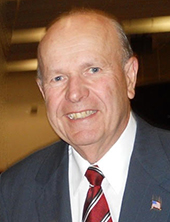
Not many PAOs get chosen for the prestigious but demanding job of
Military Assistant to the Assistant Secretary of Defense for Public
Affairs (ASD/PA). Unless, that is, you're Mike Burch. Mike was tapped
twice for the job, in two different presidential administrations
— by ASD/PA Tom Ross in the Carter administration, and again by
ASD/PA Henry Catto in the Reagan administration.
Impressive, yes. But that was just a taste of things to come.
President Ronald Reagan and Defense Secretary Caspar Weinberger
thought that Mike’s talents had much greater potential, and in 1983
appointed him to be the ASD/PA. With that appointment, Mike became
only the second retired military officer (fellow Hall of Famer Bill
Greener was the first) to hold the office since the Department was
organized in 1947.
Not bad for someone who just wanted to escape the possibility of a
mundane job in St. Louis, or of getting drafted into the Army. A
degree from the University of Missouri in 1963 and an AFROTC
commission realigned his career prospects, and his initial assignment
as the Information Officer for the 1st Air Commando Wing at Hurlburt
Field left him with experiences that shaped the rest of his twenty
year Air Force career. He would have been happy to stay right there,
but the Air Force had other ideas, sending him to subsequent
assignments at 12th Air Force, Ubon RTAFB in Thailand, and Tactical
Air Command headquarters.
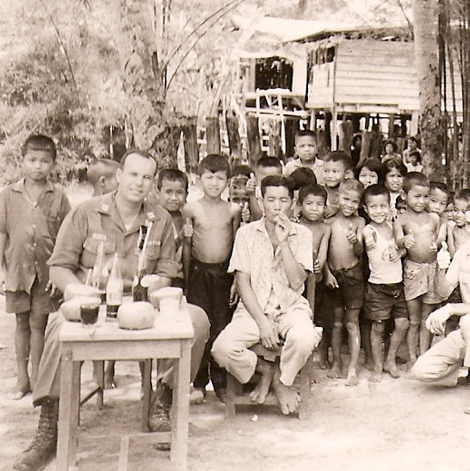
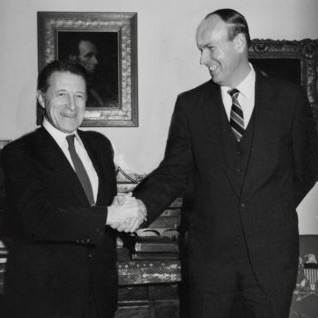
On a 1971 TDY to Australia as PAO for a squadron of F-111s, Mike
unexpectedly became an unwitting spokesman for the US Government when
he found himself in the middle of an Australian media and
parliamentary debate on whether to purchase F-111s. That TDY changed
the direction of his career, as he was summoned to the Pentagon to
brief the Secretary and Chief of Staff on the controversy, leading to
his reassignment to the Secretary of the Air Force Office of
Information (SAF/OI) in 1972.
While many do all they can to avoid a Pentagon tour, Mike enjoyed and
thrived in the high pressure Washington environment. He was the
administrative assistant to both SAF/OI director
Brig General Guy Hairston
and SAF/PA director
Brig General Jerry Dalton.
Moving from the Air Force to DoD, he was the deputy chief of the
Operation News Branch before becoming the military assistant to Mr
Ross and then Mr Catto.
Mike spent eleven of his twenty years in the Air Force at the
Pentagon. Those eleven years spanned the Nixon, Ford, Carter, and
Reagan administrations — providing him great lessons in national
defense and the ways of Washington. Retiring as a Lieutenant Colonel
in 1983, Mike remained in Washington, first joining the civilian world
as the president of Washington Communications, the publisher of the
Washington Journalism Review.
He was not in that position very long, though, before the
SECDEF asked Mike to return to the Pentagon as the tenth ASD/PA,
where he could now take those lessons he had learned and deftly put
them to use on the national and international stage. He served as the
ASD/PA from 1983 to 1985.
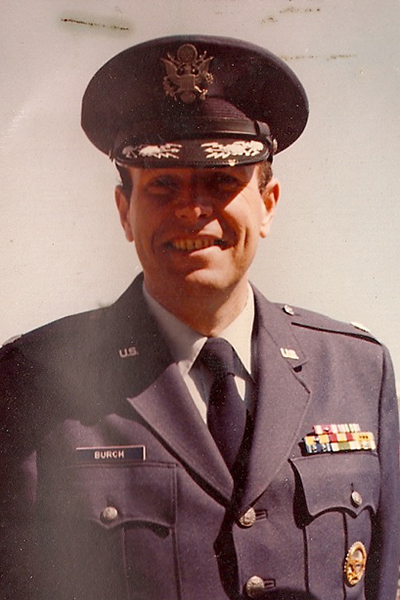
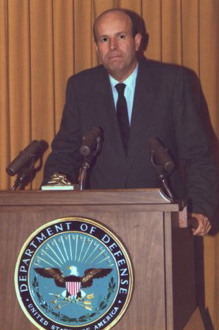
After leaving the Pentagon a second time, Mike then headed to his
boyhood home, St Louis. But his new job there was not the mundane one
he had escaped from when he was young. He spent seven years working
for McDonnell Douglas as Corporate Vice President, Public Relations.
In 2000, he founded wastewater treatment company
Nature Works, Inc,
where he remains busy, at least when he is not farming on the
weekends.
In his memoir,
Ambassadors at Sea: The High and Low Adventures of a
Diplomat,
Henry Catto praised two men in particular as examples of outstanding
military officers. One was then-Colonel Colin Powell, and the other
was Lt Colonel Mike Burch. Mr Catto said that “Mike, who succeeded me
as assistant secretary, was a genius at foreseeing problems and
offering solutions.”
Colin Powell? That's pretty heady company to be included in. But
without a doubt, that was company in which Mike belonged.